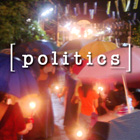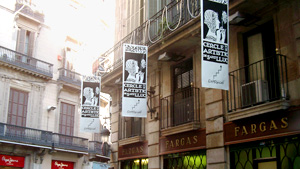
|
14 December 2005 Spain's "Popular" party (PP) has accused the regional government of Catalunya of "investigating, inspecting and sanctioning" businesses that put signs exclusively in Castilian (the language commonly known as "Spanish", though it originates in the central Spanish region of Castile, and other regions use other languages), according to La Vanguardia newspaper. The opposition PP has proposed a resolution (not binding under law) before the national Congress of Deputies that calls for the central government to "guarantee that no Spanish citizen will be persecuted for the language he uses", asserting that Catalunya's language policies contravene the nation's constitution. The PP says policies instituted by the Generalitat of Catalunya may lead to discrimination against non-catalán speakers. The ruling socialist party (PSOE) has proposed its own resolution, calling for a cooperative effort, between the central and regional governments, to "promote and protect" all of Spain's languages, as a proud sign of the nation's cultural health and plurality. Plurality and dialogue have been watchwords for the progressive policies of Pres. Rodríguez Zapatero since his days in the opposition. The PSOE is struggling to assist Catalunya's renegotiation of its regional charter, amid clamor from the opposition that Catalunya's use of the term "nation" to describe its distinct cultural history poses a threat to the political integrity of Spain. This is just the latest in a long series of controversies raised by the political and cultural rift between the regional interests of Catalunya and the centralist agenda of the PP. Catalunya's draft Estatut, intended to update and replace the existing regional charter seeks greater autonomy in terms of culture, language, and fiscal policy, this latest issue dating as far back as 1714 when the Castilian crown took control of the region's finances. Conservatives and Spanish nationalists have waged a parliamentary and public-relations campaign warning that enhanced autonomy could lead to the disintegration of Spain. Catalunya has already replaced most national police (Guardia Civil) duties with its own regional force (Mossos d'Esquadra), but the most notable effects of that shift seem to have been greater attention to public service, enhanced security in historic city centers, and an increase in the required education level of officers. The distinction bewtween the Catalán and Castilian languages dates back more than a thousand years to different strains of Roman settlers and the manner in which their Latin developed into various forms of "Vulgar Latin", or Latin as commonly spoken in a given area. Those differences, complicated by time and by countless historical diversions, have developed into two somewhat parallel but entirely unique languages, traditions and cultures. Observers on both sides of the debate conjure up dark endgames which they attribute to their opponents. Pro-Catalán politicos have claimed the Partido Popular has policies toward Spain's minority languages reminiscent of the fascist dictator Franco, who jailed people for not speaking Castilian, which he considered the "true Christian" tongue. The PP has in fact never gone so far as to persecute individual citizens for using Catalán, though they have repeatedly moved to bar minority languages from the Congress and to universalize Castilian as the one language of Spain. The PP seeks something like French language policy, which dictates that the language we call French, only one of 26 languages indigenous to France —a country which also has a diverse immigrant population speaking at least another dozen languages in notable numbers—, be the one language of a uniform national culture. Some observers have blamed the policy of "monoculture" for the socio-economic isolation which many feel led to the November riots that spread across France. Due to its long history of factional violence, and the dark legacy of repression during the 1936-39 civil war and the subsequent 36 years of fascist rule, Spain opted to make all four of its indigenous languages official languages, though until recently, its policy was that only Castilian should be used in official European Union proceedings. The PSOE has asked the EU to recognize other languages as "official" Spanish languages for use by Ministers of the European Parliament representing Spain's regionally and linguistically defined minorities. The Catalán Govern is pushing the language in schools, much because it's true that a minority language with only 10 to 12 million speakers needs all the help it can get when in direct competition for daily use with a neighboring or overlapping language, spoken by virtually all of its regular speakers and by at least 417 million —500 million by some estimates— people worldwide. In a world where English has become so prevalent as a second language, a minority language faces even greater obstacles. But here, the case of Sweden is instructive: Swedish fits into the category of languages classified as not major or not global, due to its having fewer than 10 million speakers, yet Sweden contains at least 5 recognized minority languages. But Sweden enjoys a certain stature by virtue of being the official national language. Despite the fact that many Swedes speak second languages, and many of these English, the language enjoys the protection afforded by its representing an entire nation. Also, Swedish, like Catalán, is seeing a cultural and literary resurgence. Catalán will be presented at the 2007 Frankfurt book fair as an "invited culture", recognized for the vibrant nature of its publishing industry the complexity of its literary tradition, and for its unique success in thriving despite centuries of legal obstacles to its use. Another example of linguistic plurality would be the United States. Officially, there is no national language under federal law, and any bill proposing to impose one would likely run afoul of the First Amendment to the US Constitution, barring any limit on "freedom of speech". Some 336 languages are spoken within the US, with 176 being indigenous languages, the rest —including English— imported by waves of immigration from overseas. But despite the linguistic diversity of the US, at least 52 languages formerly spoken within US territory have gone extinct, perhaps due to the prevalence of English in official and popular culture, or to competition from so many other languages and language pools. But marginalization of indigenous communities, and their dwindling populations, may also be key to explaining the disappearance of those languages. What is clear is that less-widely spoken languages can be harmed by being hidden in the shadows of an expansive international language, such as English, Castilian or French, but that they are helped significantly when official pressure is applied to "promote and protect" their use. The PP says it is worried that allowing Catalán to be officially recognized by the European Parliament or as the first language of Catalunya, perhaps already effectively decided, could result in discrimination against the majority of Spaniards who don't speak the language —in the event they should find themselves looking to study or to work in the region, the wealthiest in Spain. So, oddly, catalanistas may have won a rhetorical victory in provoking the centralization-oriented PP to seek to "guarantee that no Spanish citizen will be persecuted for the language he uses". Catalán has often been the language whose users were persecuted, and intense efforts at documentation, study, instruction and revival have been required at various times to save the language's status in widespread spoken daily use. In the case of Catalán, it is difficult to say whether formal measures are needed at the state level to protect and propagate the language. But clearly the last 30 years, during which Catalán use moved from being a criminal offense, kept behind closed doors and out of public life, to the official language choice of the regional government, has seen important recovery and forward strides for its culture, socially and editorially. [s]
UPDATE: CATALÁN SUPREME COURT RULES GOVERN MUST PROVIDE BILINGUAL INSTRUCTION For the 3rd time over the span of roughly 1 year, the Supreme Court of Catalunya has ruled that the Generalitat must provide bilingual instruction —the option to study in Castilian instead of Catalán— at least until the age of 8 in primary schools. [Full Story] |
|||||||||||||
|
||||||||||||||


